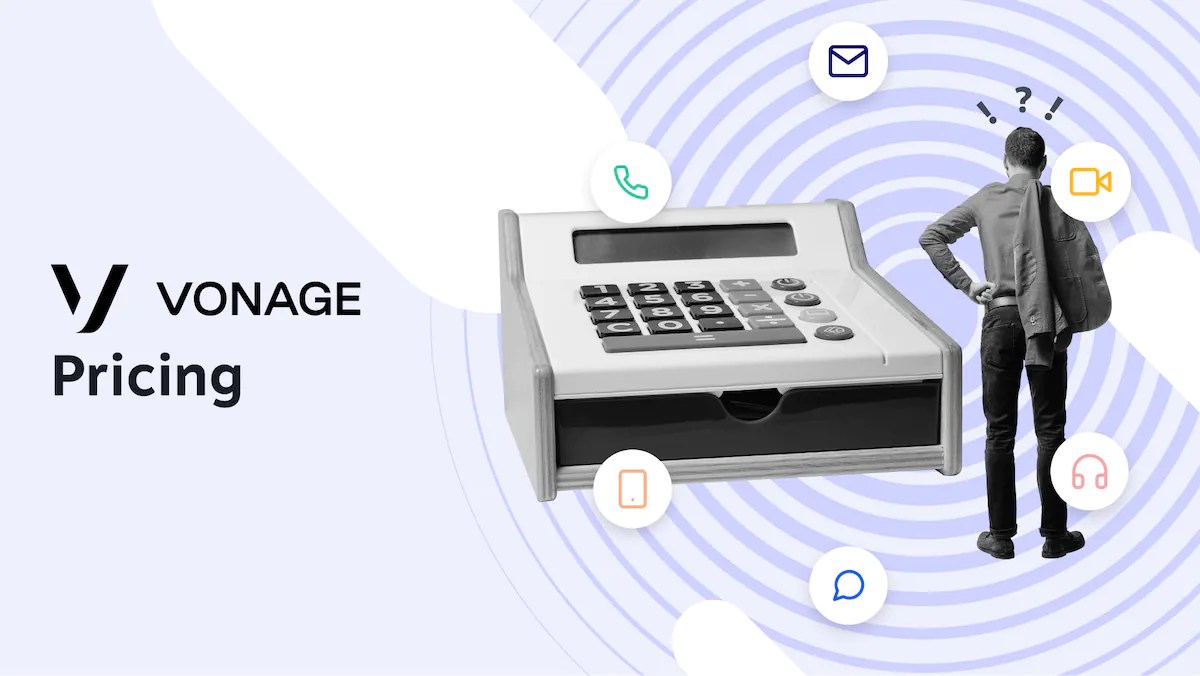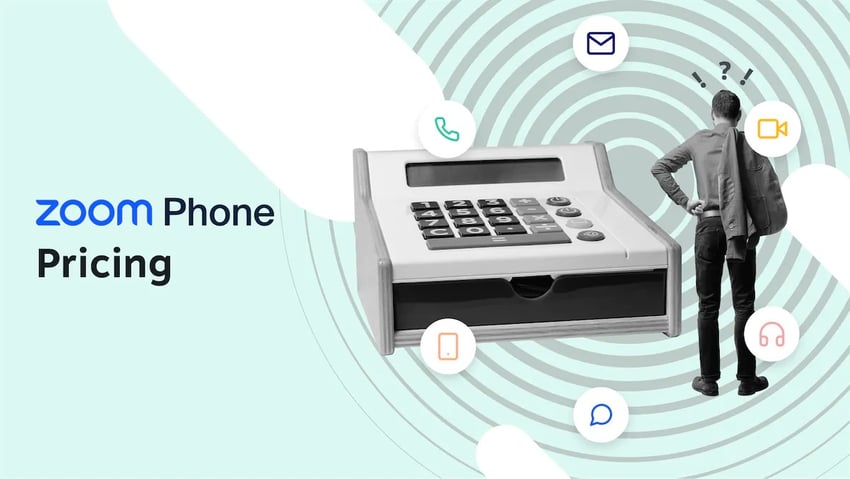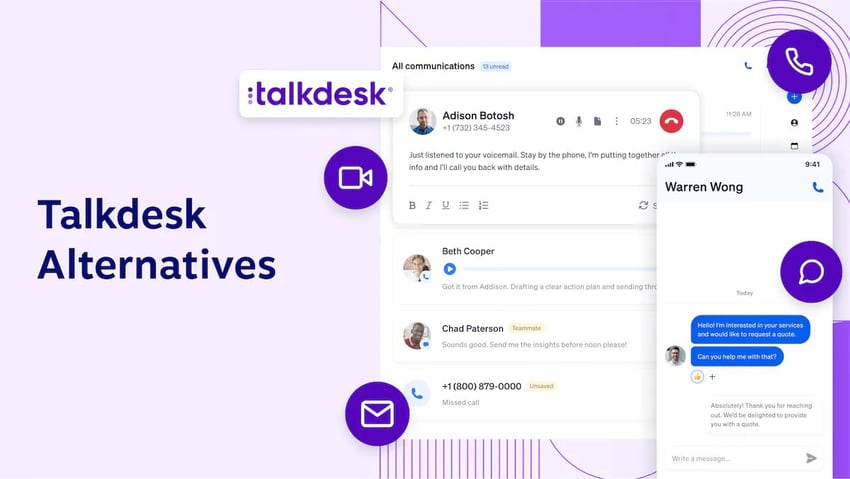Is Vonage pricing worth it? For businesses, Vonage offers a cloud-based phone system that integrates calling, messaging, video conferencing, and other features. Known for its developer-focused APIs and unified communications platform, Vonage offers advanced functionality for companies needing customizable tools.
But with its wide array of plans and add-ons, is Vonage cost-effective for budget-conscious small businesses? Or does its pricing ultimately call its value into question?
Small businesses want predictable pricing and tools that won’t slow growth. While Vonage offers flexible APIs and a range of plans, its add-on-heavy pricing can make monthly costs hard to forecast. Nextiva research shows that 60% of customers switch providers after just one or two bad service experiences, reinforcing why reliability, transparency, and support matter as much as sticker price.
We’ll analyze its pricing structure and core features to determine if Vonage is a good fit for SMBs. We’ll also compare it to Nextiva, an industry leader Vonage alternative known for affordable pricing and stellar customer and tech support.
By the end of this guide, you’ll have a clear sense of whether Vonage is worth the investment for your small business needs.
Vonage Pricing Plans
Vonage offers three main pricing plans for small businesses: Mobile, Premium, and Advanced.
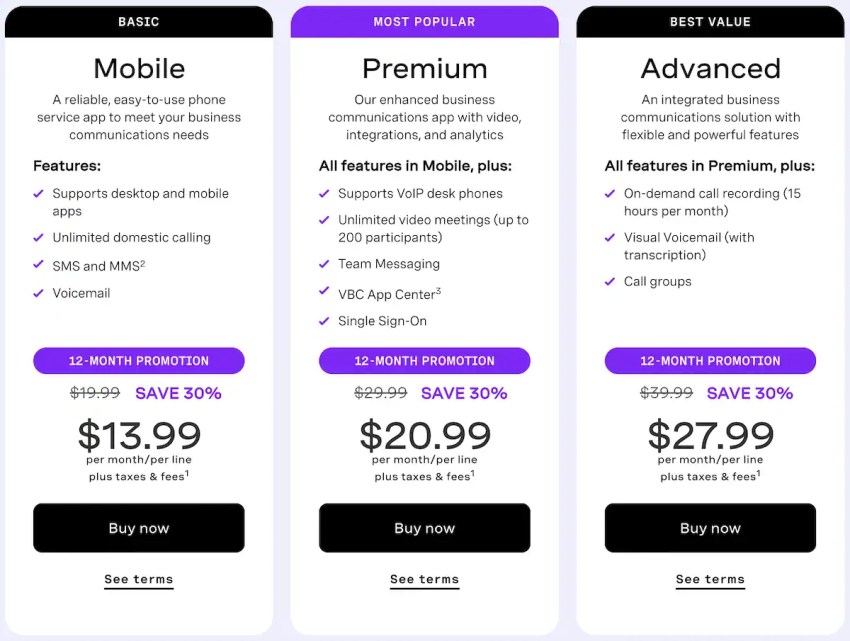
Pricing scales based on the number of users and whether you’re paying annually or monthly. So the low and high ranges you can expect to pay are $10.49 to $39.99:
Annually:
- 1-4 users: $13.99 / $20.99 / $27.99
- 5-19 users: $12.59 / $19.59 / $26.59
- 20-99 users: $10.49 / $17.49 / $24.49
- 100+users: Contact sales
Monthly:
- 1-4 users: $19.99 / $29.99 / $39.99
- 5-19 users: $17.99 / $27.99 / $37.99
- 20-99 users: $14.99 / $24.99 / $34.99
- 100+users: Contact sales
Here’s a table outlining the core features and estimated costs each month per user (based on tiers with 20-99 users):
| Feature | Mobile (Starting at) | Premium (Starting at) | Advanced (Starting at) |
|---|---|---|---|
| Price | $10.49 per user/month (billed annually) | $17.49 per user/month (billed annually) | $24.49 per user/month (billed annually) |
| Desktop and mobile apps | ✅ | ✅ | ✅ |
| Unlimited domestic calling | ✅ | ✅ | ✅ |
| SMS/MMS messaging | ✅ | ✅ | ✅ |
| Voicemail | ✅ | ✅ | ✅ |
| Virtual receptionist | ✅ | ✅ | ✅ |
| VoIP desk phone support | ❌ | ✅ | ✅ |
| Unlimited video meetings | ❌ | ✅ (up to 200 participants) | ✅ (up to 200 participants) |
| Team messaging | ❌ | ✅ | ✅ |
| Call analytics | ❌ | ✅ | ✅ |
| App integrations | ❌ | ✅ | ✅ |
| Call recording | ❌ | ❌ | ✅ (on-demand; 15 hours per month) |
| Visual voicemail | ❌ | ❌ | ✅ (with voicemail transcription) |
Monthly Add-On Costs of Vonage Business
While the base Vonage pricing plans seem attractively priced, many desired business communication features come with extra fees. These add-ons typically range from about $4.99 to $49.99 per month and include features such as:
- AI virtual assistant for call management and routing
- Business call recording
- Business inbox
- Call queue
- Call recording
- Call bridging and conferencing
- International phone number
- Local business phone number
- Local paperless faxing
- IP phone paging system
- On-demand call recording
- Secondary line appearance
- Toll-free numbers
- Virtual extensions and mailboxes
- Vonage Support Plus
With essential functionality such as call forwarding, call queuing, call recording, and advanced call routing requiring add-ons, Vonage’s total monthly cost rises quickly.
Contract length and per-minute rates
Vonage typically requires a one-year contract for new accounts. While basic plans offer unlimited domestic calling, international calls and exceeding included minutes (if applicable) may incur per-minute charges. Be sure to check Vonage’s rate sheet for specific international rates.
Free trial/guarantee
While Vonage doesn’t currently advertise a free trial, they may offer promotional trials from time to time. It’s best to check their website or contact sales for current offers.
User reviews
Vonage reviews on Trustpilot get an average of 3.3 stars:
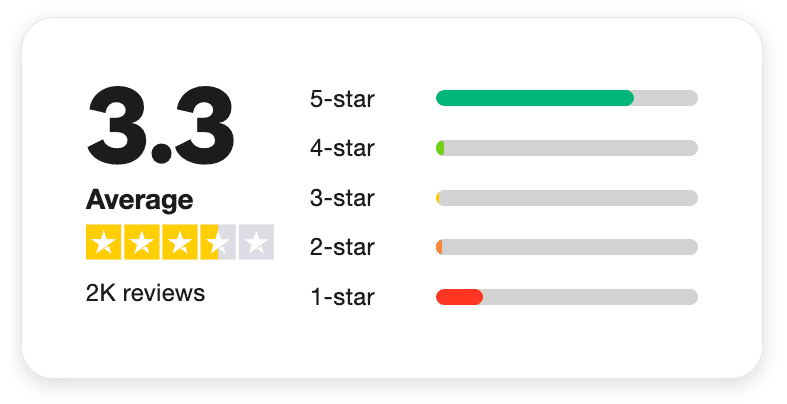
One Trustpilot user says:
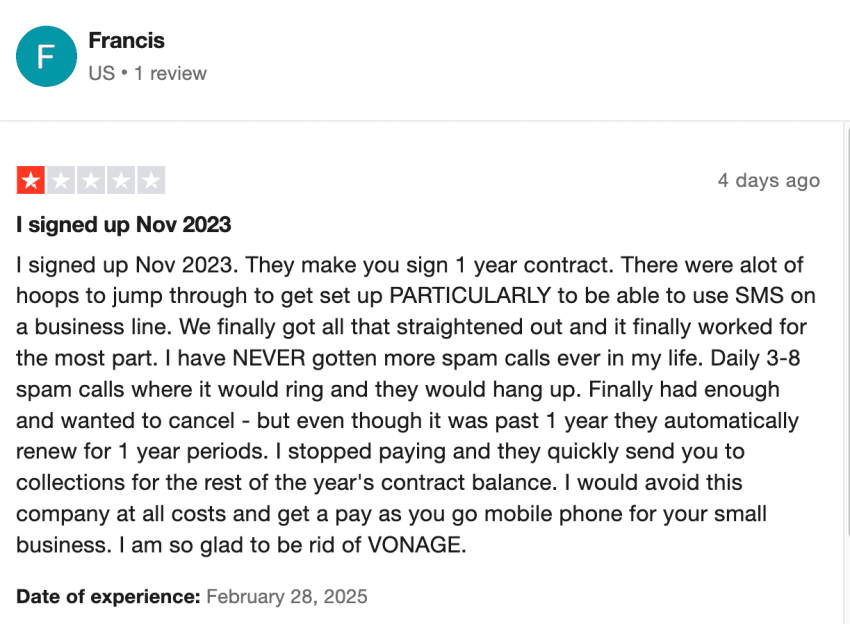
Vonage reviews on GetVoIP get an average of 3.8 stars:
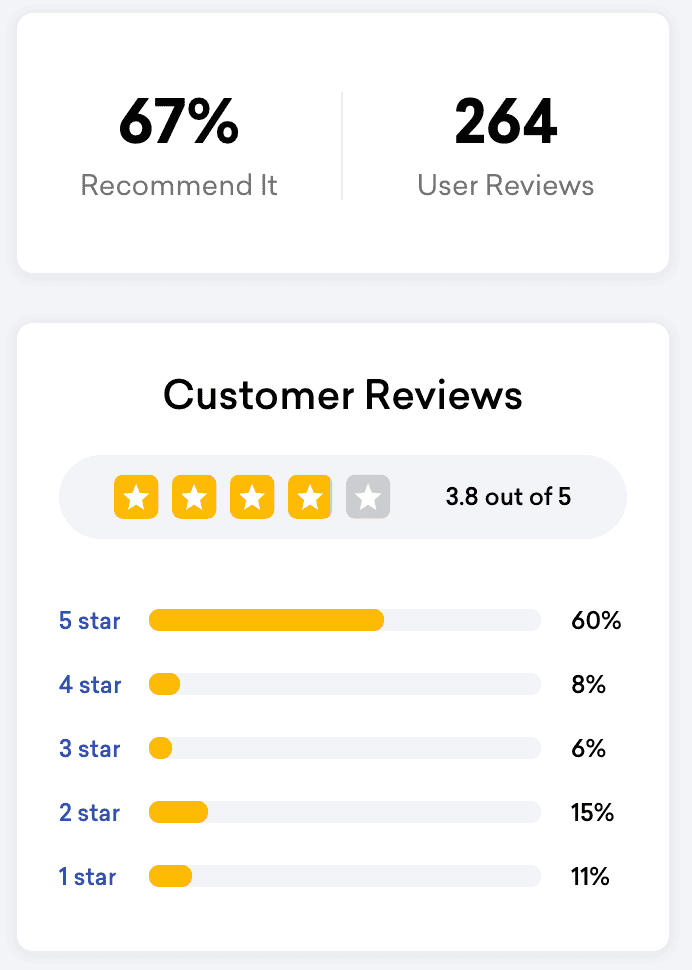
Many GetVoIP users echo this person’s experience:

Vonage vs. Nextiva
When evaluating Vonage Business, it’s helpful to consider its competitors in the business phone system market. Here’s a brief comparison with Nextiva, one of Vonage’s top competitors, to show you alternatives to Vonage.
Comparing Vonage and Nextiva side by side reveals that Nextiva offers a similar plan for $15 per user/month, with a broader range of capabilities like intelligent call routing, CRM integrations, and customizable analytics.
Let’s take a closer look at Nextiva’s pricing:
Nextiva pricing plans
Nextiva is a cloud-based VoIP alternative to Vonage, offering different plans that scale to meet growing business needs:
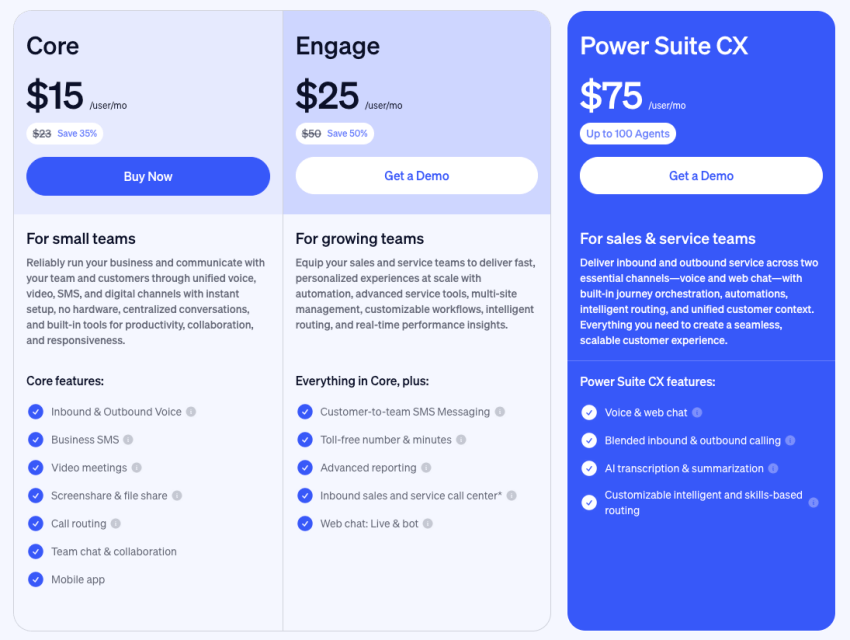
Nextiva provides greater value compared to similarly priced Vonage plans:
- Core ($15/month): Expands on the Digital plan by adding voice calls, video conferencing, and SMS text messaging functionality.
- Engage ($25/month): Builds upon Core with advanced features like call center queue management, intelligent call routing, and an AI-powered chatbot for round-the-clock customer support.
- Power Suite CX ($75/month): The most comprehensive option, including all lower-tier features plus intelligent routing algorithms, CRM/CDP integrations, and detailed supervisor dashboards for performance analysis.
Nextiva delivers more comprehensive features, enterprise-grade reliability, and greater long-term value at each plan level compared to Vonage’s offerings. Plus, Nextiva is better equipped to support business growth than Vonage’s limited plans.
Core UCaaS Features of Vonage & Nextiva
Let’s compare the two platforms’ core unified communications capabilities:
| Function | Vonage | Nextiva |
|---|---|---|
| Voice and video calling | Standard voice and video calling capabilities as offered by most UCaaS platforms. | Exceptional voice and video quality and 100+ video meeting participants . |
| Team messaging and collaboration | Basic collaboration features such as file sharing and document collaboration. | Advanced team messaging and real-time collaboration tools included in the Core plan (Vonage charges extra). |
| Mobile integration | Mobile integrations to make and receive VoIP calls, send and receive messages, and access team messages on personal mobile devices. | Mobile and desktop apps (with higher ratings than Vonage’s app) for simple communication from anywhere. |
| Conference calling and online meetings | Multi-participant online meetings and conference calls with add-ons required to expand participants. | Easy, reliable conferencing for up to 500 participants with no add-ons required. |
| Auto attendant and IVR | Call queues and advanced call flows (available as an add-on). | Advanced call routing included in plans and easy to customize. |
Expanded comparison table
| Feature | Vonage | Nextiva |
|---|---|---|
| Ease of use | Vonage requires more expertise to manage advanced features and settings. | Nextiva is intuitive and easy to use for non-technical users. |
| Scalability | Offers scalable plans and pricing for growing businesses. | Scales exceptionally well, from small businesses to enterprises. |
| Customer support | Customer service receives mixed reviews and is lacking for smaller customers. | Nextiva is renowned for stellar 24/7 customer support. |
| CRM integrations | Integrates with some CRMs but has fewer native integrations than Nextiva. | Seamlessly integrates with many popular CRMs like Salesforce, HubSpot, and Microsoft Dynamics. |
| International calling | Offers competitive international calling rates to certain countries. | Offers global calling to 40+ countries starting at $0.01 per minute. |
| Customization | Has high customization through its APIs and development platform. | Nextiva offers a no-code communication platform for businesses to use instantly. |
| Reliability | Vonage touts strong network uptime and reliability. | Nextiva delivers exceptional 99.999% uptime on its network. |
| Add-ons and upsells | Vonage’s base plans lack some essentials, pushing businesses into add-ons. | Nextiva’s plans are transparent with few surprises. |
Of particular note is the number of customer reviews for each platform, with Nextiva garnering almost seven times as many reviews with similar customer satisfaction ratings:
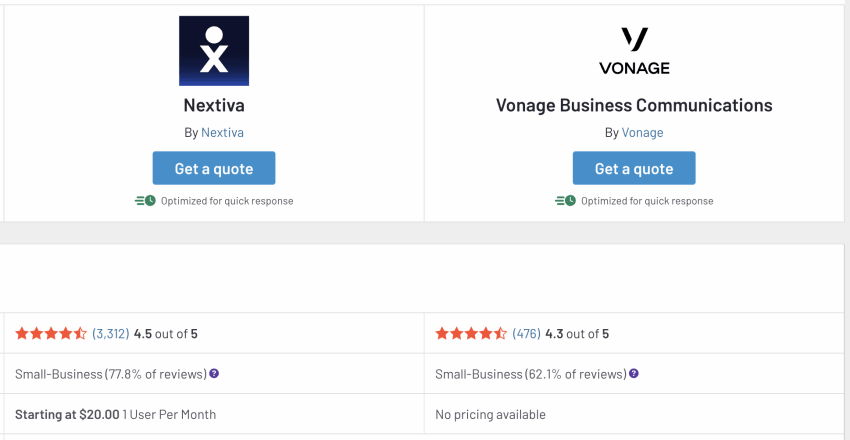
Which Provider Is Right for Your Business?
Choosing between Vonage and Nextiva depends on your company’s specific needs and priorities.
Vonage is a strong fit for:
- Software development companies: The ability to integrate communications with internal platforms through Vonage APIs makes it ideal for software firms and innovative startups building custom tools.
- International businesses: Vonage provides competitive international calling plans to many countries. For companies with offshore teams or lots of international clients, these rates are a major perk.
- Collaboration-focused teams: Vonage equips distributed teams with full-featured messaging, video conferencing, screen sharing, and other collaborative capabilities (for an added price).
- Healthcare organizations: Vonage ensures healthcare compliance and can integrate with EHR/EMR systems. Features such as two-way SMS and call recording help meet industry regulations like HIPAA.
- Customization needs: Developers can tap into Vonage APIs to create customized communications solutions tailored to unique needs, but Vonage is not ideal for out-of-the-box users.
Nextiva is best for:
- Sales-driven companies: With its expansive CRM integrations, call routing features, and analytics, Nextiva optimizes sales processes and agent productivity.
- Support and service teams: Nextiva combines call handling, omnichannel queues, and digital service channels to streamline exceptional customer service.
- Relationship-based businesses: Smart call routing, detailed analytics, omnichannel queues, and CRM integrations keep client relationships seamless and productive.
- Distributed or remote teams: Nextiva’s unified communications platform uses video meetings, team chat, document collaboration, and more to connect remote teams.
- Rapidly scaling companies: Nextiva scales gracefully from startups to large enterprises. Scaling plans is easy without major platform overhauls.
- Out-of-the-box simplicity: For non-technical users, Nextiva provides an intuitive platform with less need for costly custom development or a large IT department.
Nextiva Is a Great Vonage Alternative
When choosing a business phone system, you want a solution that’s easy to set up, packed with essential features, and ready to scale as your company grows. Nextiva delivers on all counts.
Right out of the box, Nextiva’s base plans come loaded with must-have capabilities, including intelligent call routing, CRM integrations, and mobile apps. You don’t have to pay extra for add-ons just to get started. And Nextiva’s award-winning customer support makes setup and management simple for non-technical users.
Vonage charges businesses extra for otherwise standard features. Nextiva gives you complete unified communications from day one. As your team expands, Nextiva grows smoothly with your needs without requiring major system overhauls.
For most small and mid-sized businesses, Nextiva provides the ideal combination of affordability, ease of use, and enterprise-grade power. The transparent pricing and robust features included from the start allow your team to perform at their best across voice, video, messaging, and more.
Start calling for just $15/mo.
See why over 100,000 businesses switched to Nextiva. Now you can get it all for $15/month per user.
Vonage Business Pricing FAQs
Whether Vonage is worth the money depends on your needs and budget. Here’s a breakdown to help you decide:
– Pros: Affordable plans, good call quality, feature-rich business plans.
– Cons: Requires contracts for some plans, limited features in the basic plan.
Vonage alternatives like Nextiva might be worth considering depending on your specific needs.
The best alternative depends on what features are most important to you. Here are a few popular options:
– Nextiva: Feature-rich, ideal for small teams and enterprise communication alike, offering advanced customer interaction management and internal collaboration capabilities.
– GoTo Connect: Value for money, good for globally distributed teams with video conferencing needs.
– Ooma Office: Simple and affordable, best for small companies with basic phone requirements.


















 VoIP
VoIP 
